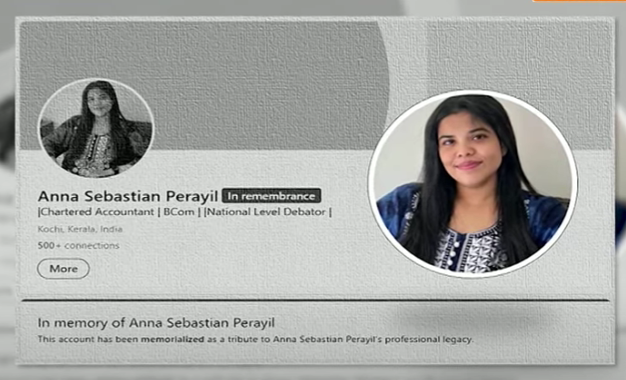The recent death of Anna Sebastian Perayil, a young EY employee in Pune, has brought the issue of toxic work culture in India’s IT sector and beyond into the spotlight. Perayil’s passing, allegedly linked to overwhelming work pressure, has triggered national outrage and renewed calls for businesses to re-evaluate their workplace practices, focusing on employee well-being.
The Glamour of IT and Metro Life: A Dark Reality
The allure of metro cities, especially in the IT sector, often paints a glamorous picture for young professionals. On the surface, these environments appear filled with opportunities and growth, attracting many bright minds. However, beneath this attractive facade lies a grimmer reality. Professionals are increasingly tied down by relentless deadlines, excessive targets, and unrealistic expectations.

Many employees find themselves going beyond their job descriptions, working overtime, and sacrificing weekends just to secure a marginal yearly increment. Even though companies promote work-life balance through official policies, these remain largely on paper. In practice, employees face pressure to extend their working hours, often in the name of client services, leaving little time for personal lives and health.
Impacts of Overwork: The Harsh Reality
For many, the result is a deteriorating work-life balance, with long-term effects on health and personal well-being. Tragically, the same companies that demand such sacrifices often lay off employees during events like economic downturns, pandemics, or corporate restructuring. Workers in both the private and public sectors, including PSUs and the banking industry, have reported similar struggles, working tirelessly under demanding conditions while lacking adequate support.
“A gun would be too violent. A noose would be to ancient. Thus, the dilemma emerged: how to conclude a once-vibrant life with a decisive finality that left little chaos behind while delivering a profound emotional resonance.
The pandemic has only worsened the situation, introducing a culture of constant virtual meetings, regardless of whether an employee is in the private or public sector. Workers are now subject to meetings scheduled at the convenience or whim of their superiors, further eroding boundaries between personal and professional lives.
Official Response to the Tragedy
Anna Sebastian Perayil’s tragic death has caught the attention of government officials and industry leaders alike. The Union Labour Ministry has initiated an inquiry to uncover the details and circumstances surrounding her untimely passing.. Minister of State for Labour, Shobha Karandlaje, expressed her condolences and stressed the commitment to ensuring a thorough inquiry into the allegations of an unsafe and exploitative work environment.
“Deeply saddened by the tragic loss of Anna Sebastian Perayil.A comprehensive inquiry into the claims of a hazardous and exploitative workplace is currently in progress. We are committed to ensuring justice, and the Ministry has officially taken up the complaint,” Karandlaje posted on X.
Former HCL CEO, Vineet Nayar, also weighed in, urging businesses to adopt a more proactive approach in supporting employees, particularly in high-pressure industries like IT. He highlighted the importance of HR departments taking a more involved role in monitoring employee well-being and mental health.
Conclusion: The Urgent Need for Change
Anna Sebastian Perayil’s death serves as a grim reminder of the dark side of modern work culture in India, particularly in the fast-paced, high-pressure IT sector. While the tragedy has sparked nationwide discussions, it also underscores the urgent need for structural changes in workplace environments, both in the private and public sectors. Companies must reassess their expectations and practices, focusing not just on productivity but also on the mental, emotional, and physical health of their employees.
Without such reforms, the cycle of overwork and burnout may continue, leaving countless professionals at risk of compromising their health and personal lives in pursuit of professional success. As investigations proceed, there is hope that Perayil’s death will not be in vain, and that it will inspire meaningful action towards a healthier, more humane work culture in India.